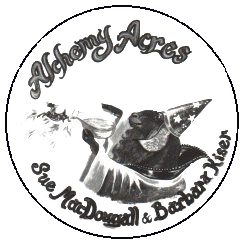Last month, we'd just acquired our first kids of the season, we'd cleaned up the birthing "mess", and we'd fed the babies their first colostrum. As we said, we feed our kids at least five times during their first 24 hours. It is very important to cram that colostrum in during those first crucial hours, as this is the time that the baby's system will absorb the antibodies from the mother's milk. And healthy babies are the goal of every herd manager. In addition to putting something INTO the baby, you want to be certain that you are getting something back OUT of that baby. You should observe that the baby is urinating and deficating normally. The first feces are generally a black "tarry" consistency. Within a couple days, this should change to a yellowish "cheesy" consistency, and in approximately one week, our kid should be passing normal goat "berries". If the baby does not deficate within the first 24 hours, you should give her an enema with lukewarm, slightly soapy water. To do this, use the enema attachment that comes with a douche bag (can be purchased in any drug store). Be very careful to not damage the rectal tissue, as she is, after all, a tiny baby. One other thing I might mention - on the off chance that your baby is too weak to eat during that first critical 24 hour period, you should feed your baby with a stomach tube. The stomach tube can be purchased from any goat supply house. For instructions on stomach tubing, consult your veterinarian. It is possible to accidentally get the tube into a lung (BAD), so be sure you understand you vets instructions completely before beginning this procedure. Suffice it to say, however, that the baby must eat to become strong and healthy, so don't just sit and wait until disaster has already struck. I'll hasten to add that most babies do not need this extra care. The great majority are "crapping and tinkling" with happy abandon right from day one. In fact, you are now going to be cleaning their area much more frequently than you really want. The babies tend to really wet their hay/bedding more than you realize, so change the bedding frequently - again, to keep your cherubs healthy. Remember --- cleanliness is next to Godliness (and smells a whole lot nicer, too).
So, lets get on to the fun stuff!!! We get to bottle-feed our kids pasturized milk every day. I don't think there is any greater pleasure than seeing your kids run to greet you when you come to the barn. You are the "mama" and chief comforter. Your Pyrinees (or other livestock guardian dog) is the chief protector, and has been introduced to your babies at the time of their births. After the first 24 hour, we feed a 7 ounce bottle three times daily, if they will take it. We also give the kids orally a couple cc's of Probios (purchase from your Co-op) to activate their little rumens. If you can't find Probios, mix a little "live culture" yogurt in with their milk. They'll reward you with faster development. After one week, the kid gets a pint (16 ounces) twice daily (for the next 5-6 weeks). You need not overstuff the kids on milk, as you want to get them started on hay and grain as soon as possible. We offer all babies hay and grain from the git-go. Sooner or later they get the idea that this is good stuff, and they'll be chowing down like the little pros they were born.
If you take the time to bottle feed pasturized milk, your kids will be much tamer, and you can protect them from a bunch of nasty diseases (e.g. CAE and mycoplasma, among others). Other chores will be a lot easier, as your cherubs will expect - no, demand - to be handled. And after a month, you will start the lifelong habit of trimming their feet (hopefully, once monthly). And at the end of the first month, you should have a baby who weighs a minimum of fifteen pounds. And it will be time to start their schedule of vaccinations. And on that happy thought, we'll leave you until next month. In the meantime, enjoy those babies.
























